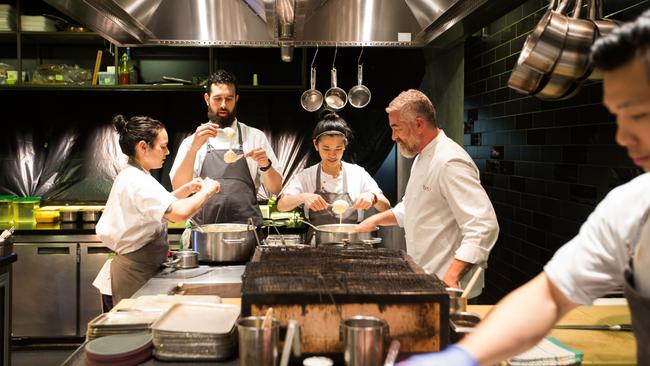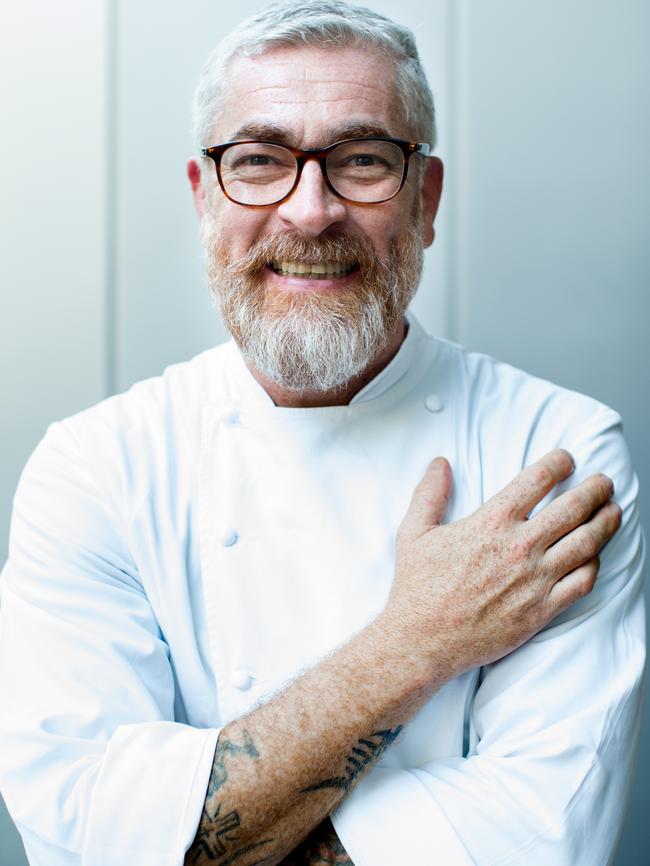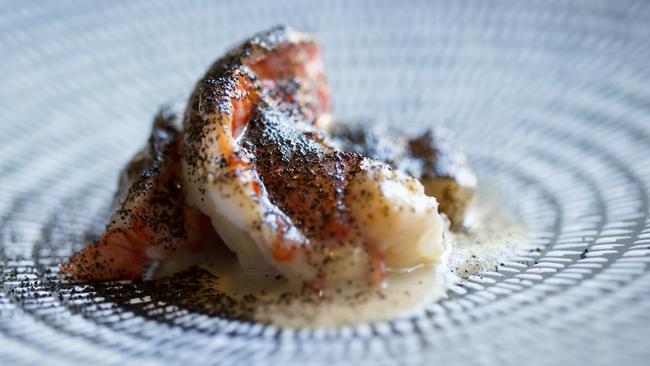Alex Atala is on an Amazonian mission
Consistently one of the world’s top restaurateurs, Alex Atala is on a mission to make Amazonian produce more marketable.

It’s early Friday morning and Alex Atala is on his way to Sydney airport. This is significant only in the sense that he arrived from Brazil around midday, Wednesday.
Having flown in as one of the 40 chefs worldwide who swapped kitchens (for a night) for what is known as the Grand Gelinaz Shuffle, the Brazilian chef — the Brazilian chef — has delighted the diners at Momofuku Seiobo for two full sittings, a monstrous day at the office in anyone’s language. Now he’s waiting for an Uber that will get him on his way to New York, via Los Angeles, surely one of the world’s most miserable plane journeys regardless of where you’re sitting.
Yet he looks outrageously relaxed. As indeed he looked the night before while working with the Momofuku team, not a hint of world-weariness, jet lag, boredom, even. Not bad for a guy on his 11th international trip in three months.
In New York, the man credited with creating a whole new contemporary Brazilian culinary scene will take the stage to address the subject on which he is most animated, passionate even; his ATA Foundation. Put simply, its aim is to help indigenous Brazilian communities by providing a commercial conduit to market for the foodstuffs they grow.

“In Brazil we have maybe a thousand projects to help local people through their own food or ingredients,” says Atala. “Our ATA Foundation runs seven projects like this. All these projects have the same problem: Brazil is a big country, it is logistic. It is expensive. It requires a middleman. So how are you going to bring something to the city and sell it at a fair price?
“What we did was have a good conversation with the mayor of Sao Paulo. We had this market and it was dirty, decadent, an awful place. So the mayor helped our foundation with the revitalisation and now this place is alive and we sell more than 600 ingredients from all over Brazil at a market price.
“They can sell a kind of Amazonas mushroom cheaper than shiitake grown in Sao Paulo. If we have these beautiful mushrooms lost in Amazonas and nobody can eat them, then maybe we’re going to lose them forever. When you talk about biodiversity it has no value. When you can taste biodiversity, it has value.”
He makes the analogy with the diversity of wines, from all over the world, enjoyed in many countries.
“We’re talking about climate, soil, grape varieties, geology. This is biodiversity. Same with beer, coffee. So the food industry can be really helpful to support local people.”
As anyone who has seen the Netflix-produced documentary series Chef’s Table episode on Atala will remember, the Brazilian fell into cooking as a young man in Europe pursuing the lifestyle of something akin to a punk, hanging out at rock concerts, painting walls to make a dollar.
“I went to Europe to live a dream,” Atala says over coffee. His neat hair and clipped grey beard — he is 49 — don’t deflect from the tattoos he got as a young rocker rather than some chef affectation later in life.
“Concerts and rock ’n’ roll. That was my dream,” he says. “To support my dream I start to work as a chef and I fell in love with this profession. So even if I didn’t go to Europe to be a chef, I left Europe with a clear decision to be a chef.”
To cut a long story short, Atala spent many years honing his skills with French and Italian food. He has now been cooking professionally for 30 years.

Back in Brazil, the demand was for European cuisine; the idea of a fine dining restaurant selling, for example, tapioca, a national staple, was unheard of.
And ultimately, he decided that a liaison of his technical skills, the freedom of the noughties gastronomic revolution as exemplified by El Bulli’s Ferran Adria, and an exploration of indigenous Brazilian ingredients and produce was the only way forward.
He wanted to acknowledge his Brazilian identity.
D.O.M., the restaurant Atala ultimately opened, took years to gain traction but when it did it became recognised around the world as a groundbreaking new slice of Brazilian cultural pie. (D.O.M. stands for Deo Optimo Maximo, which translates as ‘To God, The Good, The Great’. The Benedictine motto was often used to indicate places where weary pilgrims could eat and rest.)
The World’s 50 Best Restaurants list, on which D.O.M. has appeared for 10 consecutive years (currently at No 11), has played a significant part in that.
“I’m not sure the World’s 50 Best made me a star but it clearly helps,” says Atala, who with New York’s David Chang and Copenhagen’s Rene Redzepi appeared on the cover of Time in 2013 under the headline Gods of Food.
“The guides, the lists, they’re like a magnificent lens,” says the chef. “If you are good, this makes you even better. If you are bad … It’s clear that some chefs are in all the lists for maybe 10 years. This is consistency. That’s something that no list makes for you.”
Naturally, as a regular visitor here, he sees parallels between his own journey “exploiting” indigenous ingredients and Australia’s own development of high-end cuisine using indigenous foodstuffs.
“In Brazil,” he says, “I feel we have a deeper research into our own ingredients and through our ingredients helping local people. It feels like Brazilians are a bit more advanced on this.
“I’m talking like this because we in Brazil have achieved a collaboration with disciplines — sociologists, psychologists — they are super important for our relationship with the local people.
“So it is deeper because it’s not just chefs trying to do it …
“There are big opportunities here in Australia. The first time I came to Australia I bought a simple book with lots of beautiful photographs of Australian food and it is fascinating how we have many common points.
“Our flora and fauna are different, of course, but we share some ingredients and the way the Aboriginal techniques and the way the Aborigines found ingredients and the way they process ingredients are very similar. So it is clear that we have common points, even if the flavours and ingredients are not the same.”
All smiles, with exemplary manners and good grace, Atala excuses himself. His Uber has arrived. He will wake up in Los Angeles before crossing the US to speak at the second annual Onassis Symposium, a “conversation exploring the role of the artist in society today.”
It’s a long way from the jungle he so loves, the wild of the Amazonas, and the gritty urban society that is Sao Paulo and home to his D.O.M. kitchen.
All are parts of Atala; he would appear to be a remarkably adaptable individual.
The World’s 50 Best Restaurants will be announced in Melbourne in April next year. Alex Atala is planning to attend.
